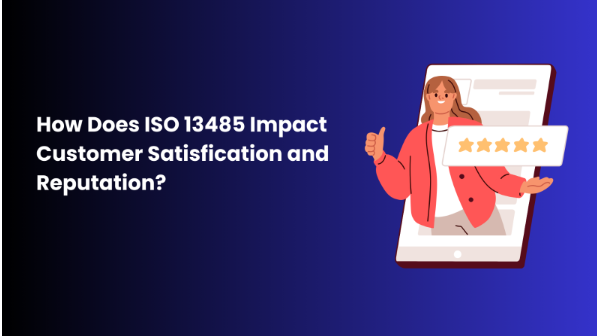Companies continuously improve the quality of their goods and services while adhering to regulatory standards. This dedication to excellence serves the interests of patients and end users in addition to the business and All of this can be easily achieved through an ISO 13485 Course, as it acts as a game-changer for your company’s success plan.
As the need for ISO 13485-certified individuals has increased significantly, people are very interested in knowing about the Benefits of ISO 13485 and how it affects reputation and client happiness, and that is what we’ll be discussing further in this blog.
Table of Contents
- ISO 13485 and Quality Management
- Customer Satisfaction and ISO 13485
- Reputation Management
- Implementing ISO 13485
- Conclusion
ISO 13485 and Quality Management
A well-structured QMS aids in the organisation of workflows, risk management, and regulatory compliance. This systematic approach not only improves operational efficiency but also reduces the likelihood of errors, making it a critical component for establishing and sustaining high-quality standards.
Your organisation may make sure that product design complies with safety and efficacy regulations by putting ISO 13485 principles into practice. By being proactive, this method reduces expensive design errors and shortens the time it takes for new items to reach the market. In the end, this increases client happiness by offering dependable, safe, and high-quality medical equipment.
Customer Satisfaction and ISO 13485
By adhering to ISO 13485 standards, your organisation can streamline operations, reduce errors, and provide goods that consistently meet or exceed client expectations. This leads to increased customer satisfaction as end users get the benefits of high-quality, dependable medical products. Customers pleased with your products are more likely to become committed brand advocates, recommending your items to others and increasing your reputation.
Product failures and recalls can be terrible for the reputation of a medical device company. They destroy trust, harm consumer relationships, and can have serious financial consequences. ISO 13485 assists in mitigating these risks by emphasising proactive quality management.
Your team will learn how to detect and address possible issues in product development and manufacturing processes by taking the ISO 13485 course. You may dramatically reduce the likelihood of product failures and recalls by addressing these issues before they become critical.
Reputation Management
Businesses with ISO 13485 certification are seen as more trustworthy and accountable, which makes them the go-to option for many clients and medical professionals. As word of your dedication to quality grows, this trust may grow beyond your present clientele and enhance your standing in the market.
Apart from fostering confidence, ISO 13485 offers a noteworthy edge over competitors. In the increasingly regulated and quality-conscious medical device sector, ISO 13485 certification distinguishes you from competitors who might not have met this need. It turns into a distinct advantage that clients appreciate and recognise.
Organisations having ISO 13485 certification have an easier time breaking into new markets, forming alliances, and obtaining contracts with healthcare facilities. This competitive advantage helps you become more visible in the market and strengthens your standing as a trustworthy, high-quality business.
Implementing ISO 13485
ISO 13485 implementation may appear difficult, but with a well-structured approach, it can improve customer satisfaction and reputation. First, get top management’s commitment, as they set the tone for the company. Complete a gap analysis to determine where your processes fall short of ISO 13485 standards and develop an improvement plan. Create a quality handbook that explains your company’s quality policy, goals, and QMS scope. Enrol your staff in ISO 13485 training to ensure they understand the standards, their compliance roles, and how their work affects product quality and safety. Document your QMS processes, including procedures, work instructions, and quality records, so all essential staff can understand them. Conduct internal audits to evaluate your QMS and find areas for improvement. Management review meetings help assess QMS performance, make decisions, and plan improvements. Finally, undergo ISO 13485 certification with a respected certification agency to demonstrate your quality commitment and acquire customer and stakeholder trust.
Conclusion
The question is not whether you can afford to adopt ISO 13485, but rather whether you can afford not to. Those who use ISO 13485 and invest in Health & Safety Courses to promote quality and customer happiness will prosper as the medical device market changes, establishing a legacy of excellence beyond industry norms.
